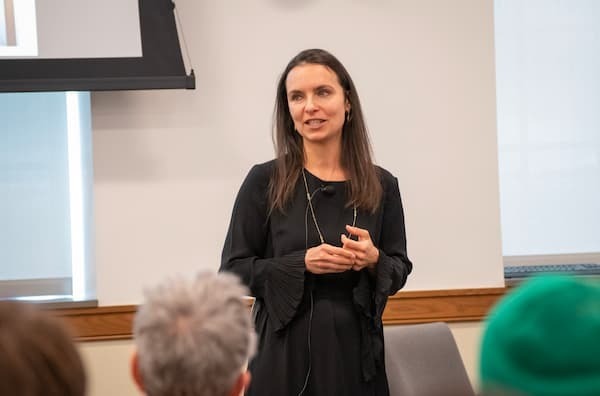
Dr. Emilia Justyna Powell is a professor of political science and concurrent professor of law at the University of Notre Dame, where she is also a faculty fellow with the Center for Citizenship and Constitutional Government. She specializes in international law and the Islamic legal tradition. Her newest book, The Peaceful Resolution of Territorial and Maritime Disputes, was published on June 9th.
Powell was born in Torun, Poland, during the communist regime. Both of her parents were lawyers, so she says that she “grew up with the law” and ended up attending the same law school as her parents. During her time in law school, she spent two years at the University of Cambridge studying British common law. Powell then studied the law of the European Union for two more years while continuing to pursue her law degree in Poland, essentially condensing nine years of typical coursework into five.
She moved to the United States to obtain her PhD in political science from Florida State University, where she fell in love with international law. Powell says that she sees legal tradition as a “fascinating phenomenon that evolves over time and cross-sectionally.”
Powell has taught at Notre Dame since 2011. Though she is based in South Bend, she often travels to interview people for her research in international law and the Islamic legal tradition. At Notre Dame, she teaches about Islamic law and constitutions, international law, and international justice. She also teaches a summer study abroad program in Poland about international law and the Holocaust.
Dr. Powell says that her Polish background and emotional attachment to her country have made conversations about the Ukraine-Russia conflict especially interesting. “This is an experience of … a violation of international law in practice,” she says. “You see refugees from Ukraine trying to make their lives somewhere else, in a different society, because a very powerful country decided to disregard the norm of territorial sovereignty.”
While teaching the course in Poland, Powell uses images from children in the Holocaust to juxtapose against photos of the Ukrainian refugee children, finding there “isn’t much difference” between the two.
“I strongly believe that, in order for us to appreciate international law, it is absolutely of utmost importance to develop a narrative of empathy where you go there and you see what is happening,” she says.
Powell finds it fascinating that every country, and every person, sees international law differently depending on one’s cultural and geo-political background. “Coming from a country that’s definitely not a global superpower really shapes your preferences,” she says of her upbringing in Poland. “When I speak to other students at Notre Dame, as well as policymakers and scholars of international law, we really tend to conceptualize international law via our own lenses,” which she says comes out clearly when focusing on place of birth and legal education. “Countries that are more powerful, especially those that are at the very top of capabilities, just conceptualize international law very differently.”
“I would say I’m very sensitive to giving all countries a voice in the global order. I very frequently speak against dominating narratives in international law that are based in Western legal thinking,” Powell says. “Those narratives over time have kind of been imposed on everybody else … I’m just sensitive to the way that different people conceptualize constitutions, conceptualize the law, justice, rule of law, and I try to stay away from arguments that portray one way of legal thinking as superior to others. I’m always speaking in terms of dialogue, conversation – not conversion – but conversation and respect.”
The Peaceful Resolution of Territorial and Maritime Disputes, which Powell co-authored with Professor Krista E. Wiegand of the University of Tennessee in Knoxville, explores these conversations in greater depth and more specifically examines how countries choose their methods of settling disputes peacefully.
The book includes interviews with many international judges, policy makers, state council members, arbitrators, and judges. Powell says that the book seeks to find an answer to the question: “How much international law does a country want to use when it has a dispute over territory or maritime zone?”
These conversations are especially critical right now, Powell says, because of the danger of escalation in territorial disputes, of which there are over one hundred across the world at this time.
Powell says that territorial disputes are “the most likely to escalate to war, military confrontation, and the most likely to produce death.” From population, ethnicity, and religion to natural resources, stragetic value, and maritime zones, territory is incredibly important because “territory defines statehood,” she says.
The publication of The Peaceful Resolution of Territorial and Maritime Disputes will be celebrated this September with a CCCG event on September 7th with Professor Powell, Professor Wiegand, and Sheikh Dr. Abdulrahman al-Salimi, an official in the Ministry of Endowments and Religious Affairs in the Sultanate of Oman.
Article contributed by CCCG Writing Fellow Merlot Fogarty.